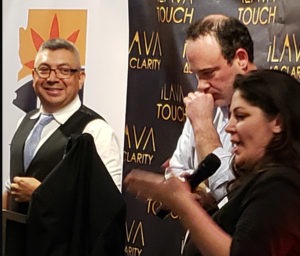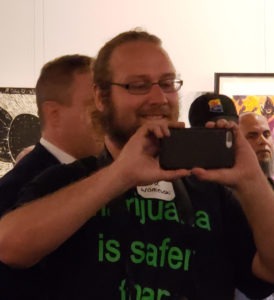[wpdevart_countdown text_for_day=”Days” text_for_hour=”Hours” text_for_minut=”Minutes” text_for_second=”Seconds” countdown_end_type=”date” end_date=”31-12-2020 23:59″ start_time=”1553787111″ end_time=”0,1,1″ action_end_time=”hide” content_position=”center” top_ditance=”10″ bottom_distance=”10″ countdown_type=”circle” font_color=”#000000″ button_bg_color=”#81d742″ circle_size=”130″ circle_border=”5″ border_radius=”8″ font_size=”30″ countdown_font_famaly=”monospace” animation_type=”none” ]AZ Legalization Success[/wpdevart_countdown]
4 Take Aways
BY MIKEL WEISSER
You can finally stop holding your breath, 2020 has “officially begun.” Last Wednesday, ADA president Steve White (Harvest Health & Recreational) set the 2020 legalization initiative countdown clock in motion, making the first public announcement of their 2020 campaign at the March MITA-AZ monthly meeting. As could be expected, the SRO overflow crowd at the Foundre Hotel in downtown Phoenix hung on White’s every word as he committed to solving the problems from last election cycle and to “let the campaign run the initiative.”
With that in mind, White’s surprisingly short opening remarks quickly gave way to handing the mic to Stacy Pearson from Strategies 360, the dynamo political consulting company hired to run the initiative. Pearson introduced herself, promised the campaign and initiative would be poll-formulated and that the polling was still underway.
And that was about it.
Aside from an extended, and often tense, Q&A that followed and kicking off the countdown clock, the big reveal turned out to be revealing the ADA is still fine tuning their language and doesn’t expect to make the ballot measure public for another two months. The term “70% completed” was bandied about, but no specific details were made available. Though many, many people asked.
Worth noting, several of the people who led the fight against Prop205 in 2016 were on hand and on guard that night, including Safer Arizona founder, Dave Wisniewski, who filmed the whole thing and posted the video on his group’s webpage. MITA-AZ host Demitri Downing was not about to let the party go sideways and the team of White and Pearson worked well together to keep the room on track.
“The main takeaway from tonight,” Downing assured the cheering crowds, “is that the 2020 campaign will have the best staff, be the best run, best funded cannabis campaign ever and we will win legalization at last.” Given the scant details from the evening, Downing may be right, the ambitions of the 2020 effort (and the urgency of donating early) were the main messages of the evening. Considering the huge amount of investment in the AZ market by Canadian canna-giants (who now hold almost 50% of AZ’s licenses), the funding aspect should be solved this round.
But beyond that, the quest to identify exactly what else was revealed left many of those attending wanting more. While the campaign proved to be surprisingly tight-lipped, careful analysis of what was said and what was not said by White, Pearson and Downing provide some insights into what to expect going forward.
1. Steve White Is Not JP Holyoak, 2020 Will NOT Be 2016
“This time around, we will let the campaign people do campaign things — we’ll fund it and step aside”—Steve White
In 2016, shortly after the bitter defeat, Phoenix New Times reporter, Ray Stern was the feature speaker at that November’s MITA meeting and did a public post mortem of the failed effort. Stern identified 2016 campaign chair, JP Holyoak as the prime reason the campaign failed by less than 67,000 votes out of more than 2.2 million cast. Holyoak, is no longer on the board of the ADA. That may be for the best when it comes to persuading voters.

As Stern noted at the time: “For whatever strengths he brought with money and organization, JP was a weak front man; and when the opposition campaigned that the initiative was a corporate takeover of the marijuana industry, his was not the face to challenge the attack.” White didn’t mention Holyoak in his brief remarks, but his repeated references to the errors of 2016, “industry people” being too controlling and the importance of listening to the campaign staff pointedly suggested that micromanaging might have been a problem that White was not about to repeat.
2. Sure, it’s a Red-State, But Blue Experience Matters
“You can’t win in Arizona without winning over suburban women” –Stacy Pearson
One of Holyoak’s biggest decisions was the political consulting company selected to frame and execute the campaign. Holyoak, believing the state was as red as he was, pushed for a conservative-minded consulting firm and picked notable rightwing spokesman, Barrett Marson to be the official point man for the campaign. Marson, having no personal experience with cannabis himself, tended to shun the cannabis community input, ignored the rural parts of the state and held many of the campaign events in trendy high dollar locales, hoping to court high dollar donors. The effect on the public however was too reinforce the imagine that the campaign was simply a power grab by the rich and powerful.

In contrast, the choice of Strategies 360, a top national centrist firm, might be the better choice for an Arizona that is steadily turning purple. Headed by no nonsense Democratic powerbroker, former State Representative Chad Campbell, and Pearson, who hung a piece of Arpaio’s tent city in the office as a trophy, expect a campaign that takes a center-center approach. With staff working campaigns in twelve different western states and DC, White’s chosen a company with a track record of winning “liberal” issues in conservative areas.
Strategies 360 boasts more than 30 years of experience in political campaigning, and already won a cannabis legalization in Alaska in 2014. Closer to home the firm was behind Paul Penzone’s historic defeat of Joe Arpaio in 2016 and put Sen Katie Hobbs in the Secretary of State’s office, the highest office a Democrat has held in the state in a decade.
While the company ranges toward the bluer end of purple, Strategies 360 aren’t wild-eyed liberals. As their website explains, “Our internal culture is a reflection of the Western code …. We’ve built a team of pros who tackle the unique issues facing the West with creativity and conviction, and who champion the entrepreneurial character at our core.” That means they know how to raise the bucks. It’s a given that the Sheila Polk crowd will once again raise millions to oppose legalization. Winning the base and appealing to all sides of Arizona’s peculiar political landscape is a must.
3. It’s All About the Algorithms
“There is a bucket of things we could want, but we’re still doing polling. It’s about finding the sweet spot with the legislative text”—Steve White
Though the consumption of cannabis does not depend on party lines, the politics of it sure do, with Democrats skewing in favor and Republicans against. Polling in 2018 showed that while 66% of Democrats support legalization, 68% of Republicans oppose it. A recent poll by OH Predictive Insights showed that as of March 2019 still only 52% of likely AZ voters favor legalization. A slim margin that can be won or lost by effective messaging. “We won’t run measures that don’t poll well,” White said bluntly.
In 2016 legalization lost by less than 57,000 votes. In 2010 medical marijuana won by only 4100 votes. The 2016 campaign showed the importance of getting the language precisely right. Since the ballot measure consists of dozens of individual provisions that can make or break individual support, gauging the exact combination of freedoms and controls that most Arizonans will vote for is a difficult calculation.
For example, including home cultivation turns off some conservative voters, but at the same it is considered a must-have for members of the cannabis community. In 2016 it’s said that one provision polled as costing 2% of the vote, the same number of votes Prop205 lost by. What about the specter of big money monopoly marijuana? It’s worth noting that though the campaign was attacked by both Polk and Wisniewski for the same issue, 2017 polling suggested that the issue of monopoly did not move the needle one decimal point.
What about parenting rights? What about municipality rights? Cottage cultivations? Testing? DUI? Teen use? All questions being polled to calculate what it takes to get across the finish line. Expect the campaign to cite polling in the wake of any challenges.
4. Keeping the Devils out of the Details
“The last bill tried to solve the world’s problems. We really, really cared about DUI. We cared so much we addressed it five times which was probably four times too many. We addressed it so much we left holes for our opponents to poke their fingers through” –Steve White
Whatever its strengths and weaknesses, Prop205 developed opponents from the left and the right. Many of them were in the room last Wednesday night. In addition to Wisniewski, longtime cannabis reformer Stacy Theis, who has already filed a would-be spoiler initiative under the guise of the Arizona Justice League, peppered White with pointed questions.

Wisniewski pointedly noted that there are hundreds of thousands of cannabis consumers in AZ and they are almost all voting age. Wisniewski cited the number 13% when he called out to White and Pearson noting, “Don’t forget the 13%. That 13% can destroy you.” With audience members like that it was not coincidental White spent much of the evening justifying the campaign’s tight-lipped approach. As White quipped to Wisniewski, “We all need to take a look at ourselves in the mirror. We created an environment by fighting over things that we didn’t need to be fighting over and it caused a lot of people to go to jail unnecessarily.”
The only state of nine that failed to pass a pro-cannabis ballot measure last election, Arizona has a long, loud, history of battling itself over weed. Some point to the state’s deeply ingrained conservative values, and others note, quite rightly, that Arizona’s governor, Doug Ducey, is one of the leading anti-cannabis voices nationwide and raised millions to stop the ballot measure. AZ business leaders like Discount Tire and U-Haul spent big in the no-campaign, Fentanyl manufacturer Insys invested a cool half million, before the CEO was arrested on racketeering charges. It’ wise to give Sheila Polk credit for calculated reefer madness. But the truth behind last cycle’s loss was far more complicated and infinitely more frustrating.
Arizona’s pro-cannabis community has been locked in a social civil war most of the decade and, like California’s failed Prop19 from 2010, the in-fighting proved one of the key causes of AZ’s lost election. Though activists participated with industry leaders in the drafting process and won key concessions, the cannabis community ultimately rejected MPP’s Prop 205 and filed their own ballot measure, known as the AZFMR, to suck energy away from MPP’s campaign. MPP’s campaign drew attention to deep divisions in the business community as well. Only about a third of AZ’s cannabis companies contributed to the campaign. Industry associations splintered into rival factions and competing trade organizations. Some dispensaries even aligned with the anti-MPP movement, most kept their heads down and tried not to get caught in the cross-fire.
This round the campaign intends to listen to all stakeholders, though can’t make any promises, other than to say it’s gonna be big. It’s gonna be well staffed. It’s almost done and it’s gonna be based on polling. In the end, White acknowledged that the initiative is still at least two months away from filing its final draft. Signature gathering will not even start for at least a month after that, as the campaign amasses a mountain of paper and an army of signature gatherers. This go-round the campaign will need to gather well over three hundred thousand signatures and so may have to print, distribute, fill in and notarize as many as 50,000 sets of the multi-page initiative text and signature sheet.
Expect activist groups and patients-rights groups from Safer Arizona to Jim Morrison’s Errl Cup to get involved in the language battle during these next two months. Watch to see how nationally recognized AZ-NORML attorney Tom Dean characterizes the initiative. His skepticism fueled much of the cannabis community resistance last round. Pay attention to the language regarding paraphernalia, an ambiguous provision in Prop205 that led to a statewide backlash from smokeshops.
Watch to see if wannabe spoiler campaign, Theis’ AZ Justice League can attain the social impact the AZFMR did in ’16, or if AZFMR itself will revive? Following the big reveal last Wednesday, many folks are still asking questions. Only one thing’s for certain so far, the clock is ticking and 2020 gets closer every second.
–-Mikel Weisser is the editor of the Arizona Cannabis Monthly and state director the Arizona chapter of NORML, the National Organization for the Reform of Marijuana Laws.



